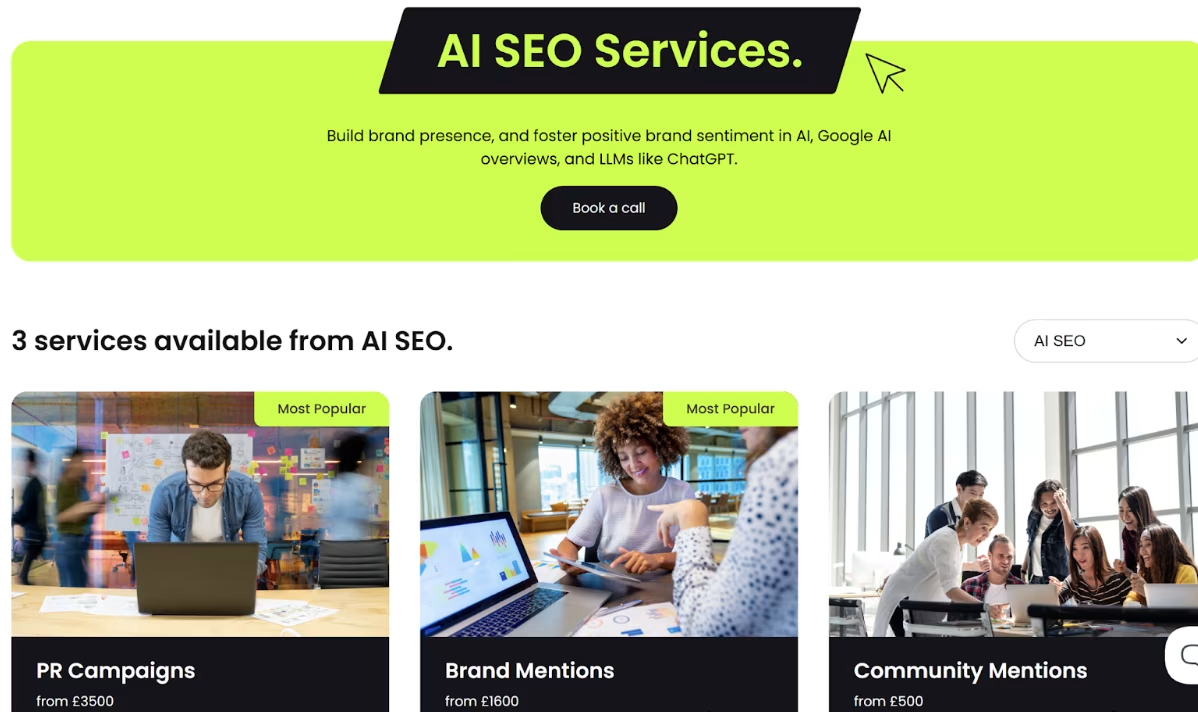How Authority Signalling Becomes Your Secret Weapon for Authentic Engagement
Picture this: you’re scrolling through LinkedIn with your morning coffee, and two posts catch your eye. One’s from a startup founder you’ve never heard of, sharing insights about sustainable packaging. The other’s from someone with “Featured in Forbes” in their bio, discussing the exact same topic. Be honest—which one are you more likely to read?
Now imagine asking ChatGPT or Claude about sustainable packaging solutions. The AI doesn’t scroll, it searches its training data for the most authoritative sources to cite. Guess which founder is more likely to be mentioned?
This isn’t about vanity or playing status games. It’s about a fundamental truth in our rapidly evolving digital world: trust (and perhaps the turth) has become the scarcest currency, authority signalling is how we spend it wisely, and increasingly, it’s AI systems—not just humans—deciding who gets discovered.
Whether you’re bootstrapping a tech startup from your kitchen table or running a community organisation on passion and determination, breaking through the noise isn’t just about having brilliant ideas anymore. It’s about being recognised as someone worth listening to—and that recognition needs to happen in seconds, not months.
What Authority Signalling Really Means (And Why It’s Not What You Think)
Authority signalling sounds rather corporate and manipulative, doesn’t it? But at its heart, it’s simply about making your expertise visible in a world that’s too busy to dig deep. Think of it as putting up a professional shop sign rather than expecting people to guess what you’re selling.
It’s the difference between saying “I know about climate change” and being introduced as “the climate researcher whose work influenced the government’s net-zero strategy.” Same knowledge, completely different reception.
For emerging organisations, this visibility becomes crucial because you’re fighting an uphill battle against established players with decades of reputation behind them. You need shortcuts to credibility—not to fake it, but to help people discover the real value you’re already creating.
The Psychology That Makes Authority Signalling Work
Here’s something fascinating: our brains are essentially lazy. Not in a bad way—they’re efficient. When faced with information overload, we rely on mental shortcuts to decide who deserves our attention.
Dr Robert Cialdini’s research on influence shows us that people naturally defer to perceived experts. It’s evolutionary—following knowledgeable leaders kept our ancestors alive. Today, it keeps our inboxes manageable.
This creates what psychologists (and Beyonce) call the “halo effect.” When someone appears authoritative in one area, we unconsciously assume they’re credible in others. A well-designed website suggests competent service. A thoughtful LinkedIn article implies strategic thinking. A university partnership hints at rigorous standards.
The key word here is “suggests.” These signals don’t create expertise—they reveal it. And in a world where excellent work often goes unnoticed, that revelation matters enormously.
The AI Discovery Revolution: Why Authority Signalling Just Became Critical
Here’s something most organisations haven’t realised yet: the future of discovery isn’t human-driven. When someone asks ChatGPT for business advice, searches with Perplexity, or relies on Google’s AI Overviews, they’re not getting random results. They’re getting recommendations from AI systems trained to identify and cite authoritative sources.
This changes everything about how people find you.
Traditional SEO was about signaling to the algorithms with keywords and backlinks. AI discovery is about genuine expertise recognition. These systems don’t just look at what you say, they evaluate who’s saying it, where it’s been mentioned, and how credible those mentions appear across the web.
Think about it: when an AI system encounters two pieces of content on climate policy, it’s more likely to cite the research from someone who’s been quoted in academic papers, featured in industry publications, and mentioned across authoritative platforms. The founder blogging from their kitchen table might have brilliant insights, but without authority signals, they’re invisible to AI discovery.
This isn’t speculation—it’s happening now. AI systems prioritise structured data, cross-platform validation, and recognised expertise. Every media mention, speaking engagement, and expert collaboration becomes a signal that helps AI systems understand not just what you know, but why you’re worth citing.
For startups and CBOs, this represents both a massive opportunity and an urgent challenge. Get authority signalling right, and you could be the expert AI systems recommend to thousands of users. Get it wrong, and you risk becoming completely invisible in an AI-driven discovery landscape.
Why Startups and CBOs Face a Double Challenge
Traditional businesses had decades to build reputations gradually. You don’t have that luxury. In our hyper-connected world, attention spans have shrunk to seconds, first impressions form instantly, and now AI systems are increasingly determining who gets discovered at all.
The Trust Gap Challenge
New ventures face what I call the “trust gap”—the space between your actual capabilities and what strangers believe about them. You might have the most innovative solution to urban food waste, but if your website looks like it was built in 2003, potential partners will unconsciously question everything else about your operation.
The Community Credibility Paradox
Community organisations face a particular challenge. Locally, you might be deeply trusted—everyone knows your track record, your values, your impact. But expand beyond your immediate network, and that trust doesn’t travel. Online, you’re starting from zero, competing with polished charities that have marketing budgets larger than your entire annual income.
This is where strategic authority signalling becomes less about ego and more about impact. If better signalling helps more people discover your work, it’s not vanity, it’s responsibility.
17 Practical Ways to Build Authentic Authority
Let’s get practical. Here are strategies that don’t require massive budgets, just thoughtful execution:
The Foundation Layer
1. Founder Visibility Your founder’s personal brand often becomes your organisation’s first impression. This doesn’t mean becoming a social media influencer, it means being genuinely present in your field. Share the real challenges you’re facing, the lessons you’re learning, the vision that drives you. Our recent tale of rebuilding this site generated a massive spike in traffic as we unveiled the real challenges faced and how we overcame them.
2. Transparent Leadership People connect with humans, not institutions. Share your team’s backgrounds, your decision-making process, even your failures. Transparency isn’t weakness—it’s confidence.
3. Consistent Professional Presence Your website, social media, and communications should feel like they come from the same organisation. Consistency suggests competence, even when resources are tight.
The Collaboration Layer
4. Strategic Partnerships Collaborate with established organisations whose values align with yours. Their credibility becomes associated with your work. A joint event with your local university carries more weight than hosting alone.
5. Community Collaborations Work with respected local leaders, other organisations, or community figures. Shared initiatives create shared authority.
6. Expert-Backed Content Interview industry experts for your blog, quote recognised authorities in your posts, or invite specialists to contribute. Their expertise reflects on your platform.
The Content Layer
7. Data-Driven Insights Original research, even simple surveys, positions you as a thought leader. “According to our recent study of 200 local businesses…” carries more weight than “We think…”
8. Quality Long-Form Content In-depth articles like our recent “How to get mentioned in AI results” post, detailed case studies such as these, and thoughtful analysis signal serious expertise. Quality always trumps quantity.
9. Whitepapers and Case Studies Document your successes in detail. Real stories of impact are more convincing than any marketing copy.
The Recognition Layer
10. Media Mentions and Press Coverage Start small—local newspapers, industry blogs, community newsletters. Each mention builds credibility for the next.
11. Speaking Engagements Accept invitations to speak at events, even virtual ones. Being introduced as a speaker automatically positions you as an expert.
12. Awards and Certifications Apply for relevant awards, pursue meaningful certifications, seek recognition from industry bodies. Even small acknowledgements add credibility.
The Social Proof Layer
13. Testimonials and Endorsements Let satisfied clients, beneficiaries, or partners speak for you. Third-party validation is always more powerful than self-promotion.
14. Participatory Events and Panels Host discussions, facilitate workshops, convene stakeholders. Being the person who brings others together suggests leadership.
15. Authoritative Social Media Presence Share industry insights, comment thoughtfully on trends, engage meaningfully with others’ content. Consistency builds recognition.
The Values Layer
16. Public Commitments to Causes Align publicly with movements or principles that matter to your audience. Moral authority can be as powerful as technical expertise.
17. Influencer Collaborations Work with people who already have your audience’s trust—not necessarily celebrities, but respected voices in your field.
Making It Measurable: Tracking Human and AI Impact
Authority signalling isn’t vanity metrics—it should drive real results across both human and AI discovery channels. Watch for:
Traditional Engagement Metrics
- Increased engagement rates on your content
- Higher quality leads reaching out to you
- More speaking invitations or collaboration requests
- Improved website trust signals (longer session times, lower bounce rates)
- Enhanced brand sentiment (trackable through tools like Google Alerts or Mention)
AI Discovery Indicators
- AI citation tracking – Monitor mentions in ChatGPT, Claude, or Perplexity responses (search for your name/organisation periodically)
- Featured snippet appearances – Being selected for Google’s AI Overviews
- Cross-platform authority mentions – Your expertise being referenced across different authoritative sites
- Entity recognition – AI systems correctly identifying your area of expertise when relevant topics arise
The goal isn’t fame—it’s effectiveness in both human and machine discovery. Better authority signalling should make your real work easier, more impactful, and more discoverable across all channels that matter.
The Authenticity Imperative
Here’s the crucial bit: every signal must be rooted in genuine value. The internet has a long memory and a keen nose for nonsense. Overstating credentials, fabricating endorsements, or claiming expertise you don’t possess will eventually backfire spectacularly.
Authority signalling works best when it’s simply making existing strengths more visible. If you’re genuinely helping people, solving real problems, or creating positive change, these strategies help ensure your work gets the recognition it deserves.
Looking Forward: Authority in an AI-First World
The future of authority is becoming both more democratic and more algorithmic. While peer verification systems and community-driven platforms are creating new ways to establish expertise, AI systems are simultaneously becoming the primary gatekeepers of discovery.
This creates a fascinating paradox: authentic authority matters more than ever because AI systems are actually better at detecting genuine expertise than traditional search algorithms ever were. They don’t just count keywords, they evaluate the depth, consistency, and cross-platform validation of your expertise.
The organisations that master authentic authority signalling—making their real strengths clearly visible to both human and AI audiences—will be the ones that thrive in an increasingly AI-mediated world. It’s not about gaming the system; it’s about ensuring your genuine expertise gets the recognition it deserves across all the channels that matter. Our favourite truth about all of this is that being more human in an increasingly AI world, can only help! Show up consistantly and with a little strategy and foresight you’ll soon be rewarded.
Your Next Steps
Start small but start deliberately. Pick three strategies from the list that align with your current capabilities. Perhaps it’s improving your website’s professional appearance, seeking out one strategic partnership, and committing to regular, thoughtful content creation.
Remember, authority isn’t about becoming someone you’re not—it’s about becoming more visible as who you already are. In a world that’s often too busy to look beneath the surface, that visibility isn’t vanity. It’s essential.
Don’t let brilliant work go unnoticed. We help mission-led founders build the authority signals that get them discovered by humans and AI alike. Ready to be the expert people cite? Let’s talk.
Frequently Asked Questions
What exactly is authority signalling? It’s the practice of making your expertise and credibility clearly visible to others, using various cues and signals that help people quickly understand why they should trust and engage with you.
Why should startups care about this? New businesses lack the reputation that comes with time. Authority signalling helps bridge the gap between your actual capabilities and what potential customers or partners perceive about you.
Can small community organisations really compete with big charities? Absolutely. Authenticity, local connections, and genuine impact often carry more weight than large marketing budgets. The key is making these strengths visible beyond your immediate community.
How do you measure if authority signalling is working? Look for improved engagement on your content, higher quality enquiries, more collaboration opportunities, and positive changes in how people respond to your organisation online and offline.
What’s the biggest risk in authority signalling? Overstating or fabricating credentials. Any authority signals must be grounded in genuine expertise or achievement. Authenticity always wins in the long run.
How does social media fit into authority signalling? Social platforms amplify your authority signals—professional presence, thoughtful content, and meaningful engagement all contribute to how others perceive your expertise and credibility.







